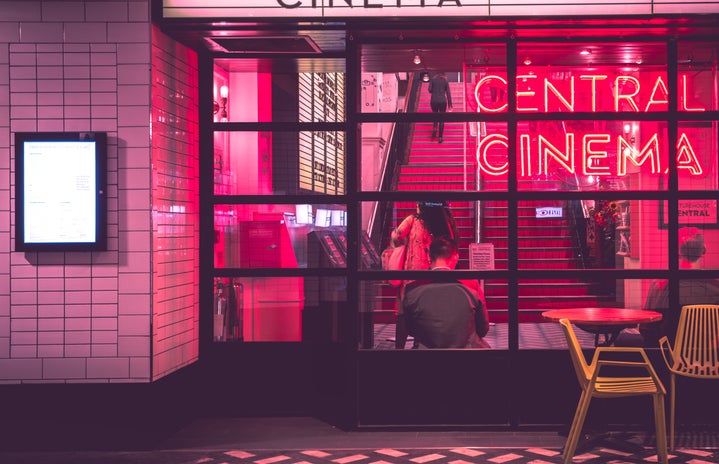Content warning for mass shootings, violence, extremist groups, and misogyny.
In The Sweet East, a bombastic political satire, Talia Ryder takes on an epic American road trip where she borrows lingerie from a white supremacist and is accidentally cast as the lead in a movie opposite Jacob Elordi. It’s somehow not as crazy, subversive, or interesting as it sounds. The film, which I expected to find the defining satire of post-January 6th America, finds itself with a gaping feminist blind spot.
The Sweet East follows Lillian, a high school senior from South Carolina on a school trip to Washington DC. While out partying with her classmates, a mass shooter enters the club and goes on a long rant taken pretty much verbatim from the “Pizzagate” shooter in 2017, establishing the film early on as being overt Trump-era political commentary. Lillian escapes unharmed, but rather than return to her friends, she begins to wander the streets aimlessly, quickly taken in by a number of unusual people who take her on an odyssey up and down the Eastern seaboard.
Each plotline unfolds roughly the same way: Lillian meets a group that represents some facet of modern political culture, and is at first interested in and then disillusioned by them.
She meets a group of vigilante activists who commit acts of hedonistic social protest, but realizes quickly that they are nothing more than kids play-acting as social justice warriors while falling back on their family money.
She stumbles into a convention of white supremacist QAnon supporters and one, Lawrence, takes a liking to her, inviting her to stay with him and attempting to educate her on his bizarre political views. While she’s content to spend time with Lawrence for a few months, ultimately she grows tired of his pretentiousness and never-explained plans with the extremist group he belongs to.
When Lillian leaves him behind, she crosses paths with two amateur filmmakers (one played by a hilarious Ayo Edebiri) who immediately want to cast her in their movie alongside Jacob Elordi (playing a British person for the second time this year—no complaints there).
On and on it goes, veering increasingly close to irredeemably problematic stories, including one where Lillian winds up accidentally trapped in a commune of Vermont-based Islamic extremists.
If you’re confused, that’s the point—I think. The film is undoubtedly meant to be bizarre, irreverent, and mostly episodic, serving as a jumping-off point for conversations about post-Trump America. Unfortunately, the movie lost me through its odd antifeminism, and the hubris of the director and writer.
I saw the film in January at a screening and Q&A with the director, Sean Price Williams, and writer, Nick Pinkerton. It was a fascinating experience, and the film had been one of my most anticipated of the year for a while. But while listening to them talk, I reflected on the blindspots white male filmmakers might have when it comes to the politics of the Trump era, and their refusal to put in the work to include other voices.
Lillian’s whole character feels like a Google search for “the male gaze” put to film. Throughout each encounter, she gazes sultrily at the object of that storyline, delicately brushing her hair from her face while asking them to enlighten her on whatever their delusional values might be.
Even when she realizes she is ensnared in the web of a very dangerous group, she is unafraid, and plays the part emotionlessly. Lillian is depicted as the seductress in multiple storylines, even initiating intimacy with Lawrence. Their storyline ends in a lasciviously shot and ultimately pointless sex scene, which is immediately revealed to be a dream—her dream, inexplicably.
Lillian is a character with a puzzling relationship to autonomy. She’s given a hollow kind of power, always the one who chooses when to leave each encounter and enter the next. However, within each of the relationships, she rarely speaks. Instead, the film devotes much of its runtime to long rants by characters who hold any number of problematic values. We never get to know Lillian as a person, or understand what draws her to these people or the trip she goes on; she is a blank canvas for every other character to project onto. We are told she represents disaffected Gen-Z youth, but she seems merely naive; it’s possible the filmmakers just have no idea what a young woman would realistically do when face-to-face with a white supremacist.
Lillian is a man’s version of a woman and an older generation’s version of Gen-Z. At the Q&A, when asked why they made the main character a young woman, Pinkerton explained that women have a certain freedom to go places that men do not, and an ability to weaponize their femininity. While it’s true that many of the characters respond to Lillian because she’s a woman, Pinkerton somehow implies that the sexism and infantilization Lillian experiences is her fault, and never even calls it sexism. I would have thought it was impossible to make a film that discusses white supremacy without discussing the role of misogyny and restrictive gender roles, but they did.
We’re also told that Lillian represents aimless, hopeless young people, but I doubt many members of Gen-Z would define themselves as such. Gen-Z is deeply empathic and tapped into injustices in our culture, and it’s members of older generations who dismiss our protests and write us off.
The Sweet East billed itself as social commentary, and both the writer and director said that they wanted to make it because no other political movies are good enough. I disagree with this claim, thinking of multiple popular examples just from the last half decade or so: Parasite, Triangle of Sadness, The Menu, Don’t Look Up, Ready or Not, Snowpiercer, Saltburn, Get Out, Fresh, The Show, and Bodies, Bodies, Bodies all address sociocultural issues in different, sometimes satirical, ways. However, I also find this to be a breathtakingly arrogant claim and one that is not supported by the caliber of the film.
Neither the writer or the director seem able to offer intersectional commentary on their subject matter, certainly never discussing race, class, or sexuality. I’m unclear on what the filmmakers want to say. I’m frustrated by the way the film sensationalizes and satirizes the views of the oppressors while failing to represent those harmed by injustice. I can’t help but reflect on the way less privileged and less self-satisfied filmmakers might have been able to offer some new insights.
The movie is visually stunning and features some of the most exciting members of young Hollywood—truly my favorite part of the movie was the behind the scenes cast content. But ultimately, The Sweet East is a gaudy attempt at satire, lacking the bite of filmmakers who understand which aspects of American politics are funny and which are matters of life and death.

